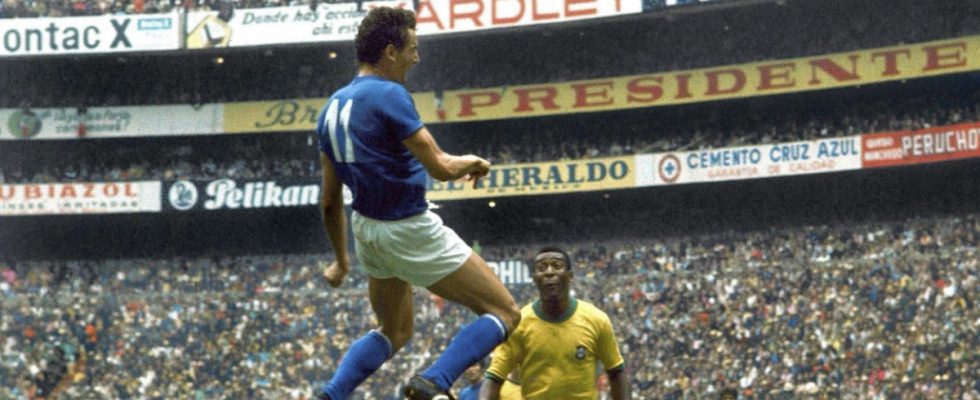When a big one leaves who has been quiet all his life, the temptation is particularly great to call after him a lot and loudly. To fill the silence, the emptiness. In the Gazzetta dello Sport it’s seventeen pages. Luigi “Gigi” Riva, probably one of the best center forwards that football has ever seen, but certainly the best that Italian football has ever seen, had a nickname that the equally great sports reporter Gianni Brera once gave him: “Rombo di tuono”, rumble of thunder.
This is how Riva attacked the opposing defense: with sheer force of nature, with speed runs that opened up the game, and with acrobatics too. And with this probably innate cunning that unconditional goal getters have in them. Almost only on one foot, however, the left one. He only used the right one for walking. Nobody scored more often for the Italian national team than Riva: 35 goals in just 42 games, a quota like a legacy. In 1968 he became European champion with the Azzurri.
Of course, everyone now remembers an afternoon in Mexico City on June 17, 1970, the game of the century in the semi-finals of the World Cup, Italy against West Germany, 4:3 – pure football nostalgia for entire generations. Riva scored to make it 3-2. His outstretched arms, his closed fists, burned themselves into the collective memory of Calcio. That team also included: Gianni Rivera, Roberto Boninsegna, Sandro Mazzola, Tarcisio Burgnich, Giacinto Facchetti. In the final it took Pelé’s Brazil to stop these Italians.
Juve patron Agnelli offered everything for Gigi Riva – it wasn’t enough
But if Italy – and Sardinia in particular – remember Gigi Rivas with so much sympathy, now that he has died at the age of 79 after a heart attack, it is at least partly due to his game, his goals. Riva impressed everyone with his human straightforwardness and his loyalty. Luigi Riva was born in Leggiuno near Varese, in the very north of Italy. The family was poor, four children, Gigi and three sisters. The father died when the boy was nine years old. The mother had to work, so they took Luigi to an orphanage.
At that time, Riva once said that he had experienced the humiliation that all poor people suffered. “We always had to be quiet, obedient, orderly – like old children.” The mother soon died too. Luigi Riva stood out at summer tournaments. He showed an extraordinary seriousness when playing football; life had trained it in him.
Cagliari Calcio brought him to the island when he was 19. And Gigi Riva would spend his entire career here. He resisted all sirens: Inter, Milan, Juventus Turin – all the big clubs wanted to bring him over. Gianni Agnelli, patron of Fiat and Juve, offered him a billion lire if he came to Juve, a completely crazy sum at the time. But Riva refused, he had found his soul home. With and thanks to Riva, Cagliari became Italian champions in 1970, it was the Sardinians’ first title and remains their only one to this day.
Riva was more Sardinian than the Sardinians – and he came from northern Italy
At that time, Sardinia was deep south, poor and left behind. In the cliched perception of the mainland, the island was a haunted spot in the sea, for shepherds and bandits. With his stubborn refusal to follow the lure of wealth and fame, Riva contributed significantly to the Sardinians’ ability to strengthen their self-esteem, says the Sardinian writer Marcello Fois. Riva was more Sardinian than the Sardinians, a parade Sardinian. They also called him the “King of Sardinia”.
In 1976 he stopped playing for the umpteenth time after a serious injury. Riva never backed down; his opponents broke his bones. From 1990 to 2013 he was team manager of the national team, mascot and father figure for the boys. Quiet and strict. The flags in Sardinia are hung at half-mast until his burial.

